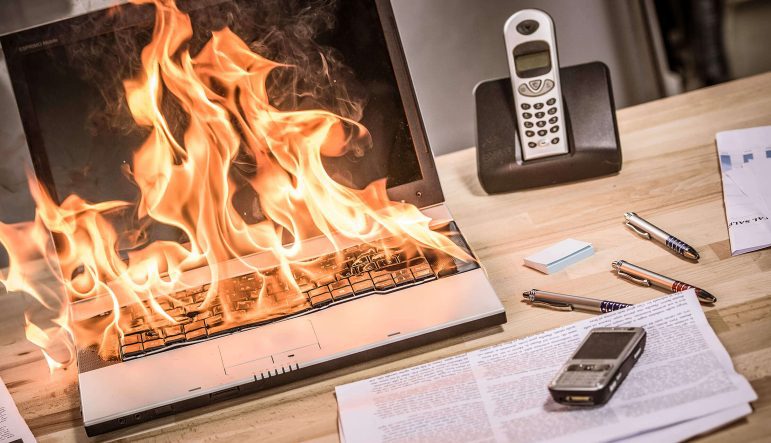Lithium Ion Battery Fires: Causes, Prevention, and Safety Measures…

In this fast-paced digital world, lithium-ion batteries have become an integral part of almost all devices that are used in our day-to-day lives. Smartphones, laptops, electric vehicles, e-cigarettes, and many more devices come with lithium batteries. The compact size, high energy density, and rechargeability of these batteries make them inevitable for modern technology and sustainable energy solutions. The widespread usage of such batteries also raises a concerning issue: The risk of a lithium battery fire. These fires can have devastating consequences, posing severe threats to property, the environment, and human safety. Let’s explore the causes behind lithium-ion battery fires, explore preventive measures, and discuss safety protocols to minimize the potential hazards of these powerful energy sources.
How does Lithium Ion Battery Fire Occur?
According to the Federal Aviation Administration (FAA) report, more than 300 incidents involving the burning of lithium-ion batteries occurred in the aviation industry alone between 2005 and 2022.
There are two types of failures that occur in Lithium batteries: one is due to failure in the manufacturing of the battery, and the other is due to several reasons. The recent withdrawal of the Samsung Galaxy 7 from the market is a recent example of the former reason.
The other reasons are given below:
- Short circuits happen due to defects in manufacturing, and this may lead to a fire.
- Overheating occurs on loading docks and may lead to combustion.
- Dropping the batteries carelessly may lead to blasting.
- The humidity or wet battery may trigger short circuits in the battery, causing a fire breakout.
Now its the time to explore how to extinguish a lithium battery fire.
How to Put Out a Lithium Battery Fire?
Before heading to the reason, you should first identify the various types of fire as Class A, B, C, D, and K. Despite its name, a lithium-ion battery does not contain any lithium metals. As a result, a Class D fire extinguisher cannot put out a lithium ion battery fire since it can suppress metallic fire combustion.
The lithium-ion batteries work in an electrolysis process, and liquid electrolytes are used for conduction. Therefore, they fall under the class B flammable liquid hazard, and thus a dry chemical fire extinguisher can be used to put them on fire.
A dry chemical fire extinguisher contains powdered graphite, CO2, sodium carbonate, and ABC chemicals. As we know, the battery pack burns at different times since it contains different cells. If it did, then keep the battery outside until it completely burns out.
If the fire cannot be suppressed, then fill the surrounding area of the burning battery with water to prevent further spreading.
Lithium-Ion Battery Fire: Safety Measures To Consider
A lithium-ion battery fire occurs when the battery overheats, leading to a rapid and uncontrolled release of heat and the possibility of flames. Numerous factors, such as overcharging, physical harm, manufacturing defects, or exposure to high temperatures, can cause this.
If not managed properly, such incidents can lead to significant property damage, injuries, and environmental hazards. By giving proper guidance and training to the people, the lithium battery fire can be avoided to some extent.
Let’s go through some of the safety measures that have to be followed to prevent a lithium-ion battery fire.
- Follow the proper regulations for battery disposal from the authorities
- Follow the guidelines from the manufacturer for the proper suppression of fire
- It’s mandatory to use device-specific batteries and charging chords for these particular devices.
- Do not keep the batteries at extreme temperatures
- Avoid placing the batteries in a place that is directly exposed to sunlight
- Keep the batteries in a fire-resistant container with proper ventilation.
- Remove the batteries from charging once they are fully charged
- Do not use or keep the devices under the pillow
- It is mandatory to check whether the battery comes from the original manufacturer after the replacement
- Immediately remove the battery from the device if it is damaged, hot, or inflated
In order to follow the above safety precautions, you need the expertise of an experienced fire safety company that follows the NFPA.
Shield Yourself from Lithium-Ion Battery Hazards with TAS Fire Protection
As the rate of explosions from lithium battery fires increases, companies should be more careful to prevent the hazards and also inform their employees about them. For this reason, it is mandatory to partner with a professional and expert fire safety company. TAS Fire Protection offers all kinds of fire protection services, including the installation and maintenance of fire extinguishers, fire alarms, sprinkler systems, etc.
Frequently Asked Questions (FAQs)
- What are the common causes of lithium-ion battery fires? Lithium-ion battery fires can be caused by factors such as physical damage to the battery, overcharging, exposure to high temperatures, and manufacturing defects. Internal short circuits, which may occur due to a separator failure or metal particle contamination, can also lead to fires.
- How to safely dispose of old or damaged lithium-ion batteries? To safely dispose of old or damaged lithium-ion batteries, take them to designated recycling centers or collection points. Do not throw them in regular trash bins, as they can be hazardous to the environment. Many electronic stores and recycling facilities accept used batteries for proper recycling.
- What should we do if a lithium-ion battery catches fire? If a lithium-ion battery catches fire, it is crucial to take immediate action. Do not attempt to put out the fire with water. Instead, use a Class D fire extinguisher or a fire blanket specifically designed for lithium battery fires. If those are not available, evacuate the area, and contact emergency services.
- Can storing lithium-ion batteries in extreme temperatures be dangerous? Storing lithium-ion batteries in extreme temperatures can be dangerous. High temperatures can cause the battery to overheat and potentially catch fire. Similarly, extremely cold temperatures can lead to reduced battery performance and damage. It’s best to store lithium-ion batteries in a cool, dry place and avoid exposing them to extreme temperatures.
- Who helps protect against Lithium-Ion Battery Hazards? TAS Fire Protection offers expert solutions to safeguard against Lithium-Ion Battery Hazards. Our services include battery fire risk assessment, safety measure implementation, training, and the supply of advanced fire protection equipment to ensure your safety in dealing with lithium-ion batteries.
Contact Us (905-870-7779) for a Free Consultation!
—

About TAS Fire Protection
TAS Fire Protection offers comprehensive and cutting-edge fire, security, and electrical services to clients with residential, commercial, industrial, or high-rise properties. Our team of highly skilled professionals has years of experience in installing, maintaining, and inspecting fire, security, and electrical systems and equipment.
> Learn More

